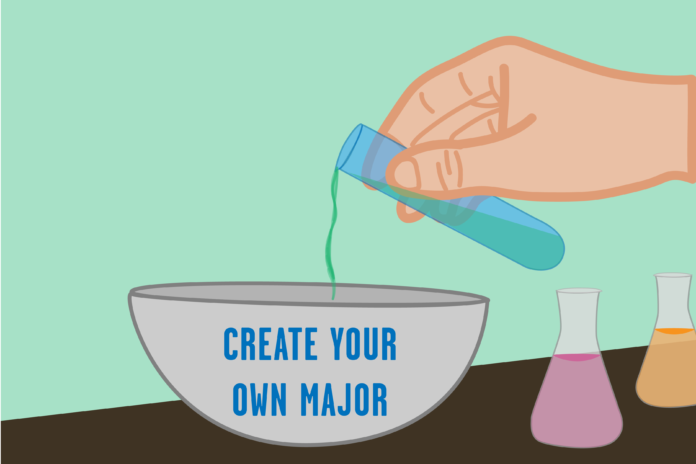Weighing the benefits and drawbacks of creating your own major
Creating an individual major might sound like a good idea, allowing for total autonomy over your studies and a finite understanding of subject matter that inspires you. That being said, Kate Creveling, an academic advisor from the College of Letters and Science, cautions that constructing a major is not for the faint of heart. The process of designing a major takes extensive time and energy that Creveling believes may be better spent pursuing other advancement options.
Because the major designing process is a long and grueling one, students are often unwilling to pursue this option.
“It is a lot of work for students” Creveling said. “It is almost as if they are creating their own masters course work.”
Creveling believes that students who are interested in pursuing this option often don’t know what they are getting themselves into when beginning the process. There are many negatives that coincide with a creating an individual major, one of which is its limiting nature. Students trying to create individual majors often run into the issue that the College of Letters and Science is the only college that offers the create-your-own major option, therefore the coursework chosen must be mostly offered by this particular college. Creveling believes this can be a hindering factor for students hoping to create a major which combines very different disciplines.
“We could not support a music engineering major, for example, because they would be required to take at least half of the classes in a different college” Creveling said.
According to Creveling, however, if a student can make it through the process, they will likely come out of it with new skills and opportunities. In order to design an individual major, a student must research extensively about the classes they plan to take, giving them an understanding of their subject matter and total control over their own path.
A comprehensive action plan and consistent communication are essential for success. These are skills that Creveling believes students can put to good use in future projects and careers.
“In order to do this you have to engage, think critically and come up with curriculum” Creveling said.
Designing a major is also a way to make personal relationships connections with faculty. While many students aim to avoid interaction with professors altogether, individual major students do not have this option. The key to designing a major is obtaining faculty support and finding professors who will take the steps with the student to reach the final result.
“Finding a faculty member on our campus who can support a student’s endeavor is the most important” Creveling said. “At the end of the day, it is a faculty committee that is going to vote on the major’s approval.”
Through this process, students develop personal relationships with professors which may provide opportunities that they may not have otherwise gotten.
“By making relationships with faculty they are setting themselves up for success” Creveling said.
One reservation students have in pursuing an individual major is that their diploma won’t state the name of their designed major, but rather it will say “individual major.” For students, this provokes concern about whether or not they will be taken seriously when applying for graduate school or jobs.
“The diploma is going to say ‘individual major’,” Creveling said. “So what I often tell students is that their time may be better used applying for masters programs that has the type of program they are looking for.”
On the other hand, having ‘individual major’ on your diploma has its benefits when applying for graduate school. In a graduate school interview, a student may be asked to describe their individual major, in turn giving them an opportunity to discuss the initiative they took in pursuing their passions.
“I think creating an individual major shows a lot of initiative,” Creveling said.
According to Creveling, there is not a lot of difference between completing an individual major and pursuing a masters degree. She often prompts students to consider graduate school as their primary option, but remains sympathetic towards factors that may inhibit them.
“Certainly time and money are factors,” Creveling said. “But if you have enough passion to create this program, it seems a graduate program would be the next natural step anyway.”
Regardless, because each student is unique, Creveling maintains that this is a great option for students who passionately want to pursue it.
“If they have a distinct passion and they fit all these parameters we definitely want to give them this option,” Creveling said.
While creating an individual major has positive and negative factors, the option is there for a reason. For students who are extra motivated to determine their own path, having the ability to design their college experience is one they feel will take them further. Creveling believes that dedication and willingness to work hard are the only ways to find success in designing a major. Students who want to pursue this need to be “very self motivated and have really thought it out.”
Written by: Miki Wayne — features@theaggie.org





